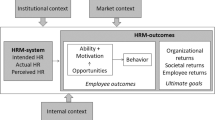Abstract
This article reports findings from qualitative case studies of three different school districts that have experience with similar teacher evaluation systems. The study focuses in depth on teachers' responses to feedback, enabling conditions, and perceptions of fairness of systems that have extended beyond a pilot stage. A conceptual model is used to organize the data related these variables using domains of teaching practice, explicit standards, and detailed performance rubrics. The results are discussed in view of contextual variables framing implementation of the teacher evaluation systems in these three districts. Issues related to use of a single set of evaluation criteria, principals as evaluators, how to balance evaluation burdens with making reliable and valid decisions, human resource alignment and training in teacher evaluation systems are discussed. Sets of researchable propositions are formulated that address these issues and the findings are discussed in view of developing and implementing standards-based teacher evaluation systems.
Similar content being viewed by others
References
Bandura, A. (1977). Self-efficacy: Toward a Unifying Theory of Behavioral Change. Psychological Review, 84(2), 191-215.
Bransford, J.D., Brown, A.L., & Cocking, R.R. (1999). How People learn: Brain, Mind, Experience, and School. Washington, D.C.: National Academy Press.
Brophy, J. (1986). Teacher Influences on Student Achievement. American Psychologist, 41(10), 1069-1077.
Claudet, J.G. (1999). An Interpretive Analysis of Educator Change Processes in Response to a Program Innovation: Implications for Personnel Evaluation. Journal of Personnel Evaluation in Education, 13(1) 47-69.
Connecticut State Department of Education (2001). The Beginning Educator Support and Training Program (BEST). Handbook for the Development of a Teaching Portfolio: Science, 2001-2002.
Danielson, C. (1996). Enhancing Professional Practice: A Framework for Teaching. Alexandria, VA: Association for Supervision and Curriculum Development.
Danielson, C. (2001). Keynote speech before the Framework for Teaching Users' Conference, June 23–26, Cleveland, Ohio.
Danielson, C., & McGreal, T.L. (2000). Teacher Evaluation to Enhance Professional Practice. Alexandria, VA: Association for Supervision and Curriculum Development.
Darling-Hammond, L., Wise A.E., & Klein, S.P. (1999). A License to Teach: Raising Standards for Teaching. San Francisco, CA: Jossey-Bass.
Davis, D.R., Pool, J.E., Mits-Cash, M. (2000). Issues in Implementing a New Teacher Assessment System in a Large Urban School District: Results of a Qualitative Field Study. Journal of Personnel Evaluation in Education, 14(4), 285-306.
Dwyer, C.A. (1994). Development of the Knowledge Base for the PRAXIS III: Classroom Performance Assessments Assessment Criteria. Princeton, NJ: Educational Testing Service.
Gilliland, S.W., & Langdon, J.C. (1998). Creating Performance Management Systems That Promote Perceptions of Fairness. In J.W. Smither (Ed.), Performance Appraisal: State of the Art in Practice. San Francisco, CA: Jossey-Bass.
Hunter, M. (1985). What's Wrong with Madeline Hunter? Educational Leadership, 42(5), 57-60.
Johnson, B.L. (1997). An Organizational Analysis of Multiple Perspectives of Effective Teaching: Implications for Teacher Evaluation. Journal of Personnel Evaluation in Education, 11(1), 69-87.
Joint Committee on Standards for Educational Evaluation (1988). The Personnel Evaluation Standards: How to Assess Systems for Evaluating Educators. Newbury Park, CA: Sage Publications.
Kelley, C. (1999). The Motivational Impact of School-based Performance Awards. Journal of Personnel Evaluation in Education, 12(4), 309-326.
Keeping, L.M., & Levy, P.E. (2000). Performance Appraisal Reactions: Measurement, Modeling, and Method Bias. Journal of Applied Psychology, 85(5), 708-723.
Loup, K.S., Garland, J.S., Ellett, C.D., & Rugutt, J.K. (1996). Ten Years Later: Findings from a Replication of a Study of Teacher Evaluation Practices in Our 100 Largest School Districts. Journal of Personnel Evaluation in Education, 10, 203-226.
McLaughlin, M.W., & Pfeifer, R.S. (1988). Teacher Evaluation: Improvement, Accountability, and Effective Learning. New York, NY: Teachers College Press.
Milanowski, A.T., & Heneman, H.G., III (2001). Assessment of Teacher Reactions to a Standards-Based Teacher Evaluation System: A Pilot Study. Journal of Personnel Evaluation in Education, 15(3), 193-212.
Natriello, G. (1984). Teachers' Perceptions of the Frequency of Evaluation and Assessments of Their Effort and Effectiveness. American Educational Research Journal, 21(3), 579-595.
Nelson, B.S., & Sassi, A. (2000). Shifting Approaches to Supervision: The Case of Mathematics Supervision. Educational Administration Quarterly, 36(4), 553-584.
Peterson, C.H. (1982). A Century's Growth in Teacher Evaluation in the United States. New York, NY: Vantage.
Peterson, K.D. (1995). Teacher Evaluation: A Comprehensive Guide to New Directions and Practices. Thousand Oaks, CA: Corwin.
Peterson, P.L., & Comeaux, M.A. (1990). Evaluating the Systems: Teachers' Perspectives on Teacher Evaluation. Educational Evaluation and Policy Analysis, 12(1), 3-24.
Sawyer, L. (2001). Revamping a Teacher Evaluation System. Educational Leadership, 58(5), 44-47.
Schon, D.A. (1987). Educating the Reflective Practitioner: Toward a New Design for Teaching and Learning in the Professions. San Francisco, CA: Jossey-Bass.
Scriven, M. (1981). Summative Teacher Evaluation. In Jason Millman (Ed.), Handbook of Teacher Evaluation. National Council on Measurement in Education. Beverly Hills, CA: Sage.
Shulman, L.S. (1987). Knowledge and Teaching: Foundations of the New Reform. Harvard Educational Review, 57(1), 1-22.
Stallings, J., & Krasavage, E.M. (1986). Program Implementation and Student Achievement in a Four-Year Madeline Hunter Follow-Through Project. The Elementary School Journal, 87(2), 117-138.
Stiggens, R.J., & Duke, D.L. (1988). The Case for Commitment to Teacher Growth: Research on Teacher Evaluation. Albany, NY: State University of New York Press.
Stodolsky, S.S. (1990). Classroom Observation. In J. Millman & L. Darling-Hammond (Eds.), The New Handbook of Teacher Evaluation: Assessing Elementary and Secondary School Teachers. Newbury Park, CA: Sage.
Strong, J.H., & Tucker, P.D. (1999). The Politics of Teacher Evaluation: A Case Study of New System Design and Implementation. Journal of Personnel Evaluation in Education, 13(4), 339-359.
Wise, A.E., Darling-Hammond, L., McLaughlin, M.W., & Bernstein, H.T. (1984). Teacher Evaluation: A Study of Effective Practices, Prepared for the National Institute of Education. Santa Monica, CA: Rand Corporation.
Yin, R.K. (1993). Applications of Case Study Research. Thousand Oaks, CA: Sage.
Yin, R.K. (1994). Case Study Research: Design and Methods, (2nd edn.) Thousand Oaks, CA: Sage.
Author information
Authors and Affiliations
Rights and permissions
About this article
Cite this article
Kimball, S.M. Analysis of Feedback, Enabling Conditions and Fairness Perceptions of Teachers in Three School Districts with New Standards-Based Evaluation Systems. Journal of Personnel Evaluation in Education 16, 241–268 (2002). https://doi.org/10.1023/A:1021787806189
Issue Date:
DOI: https://doi.org/10.1023/A:1021787806189




